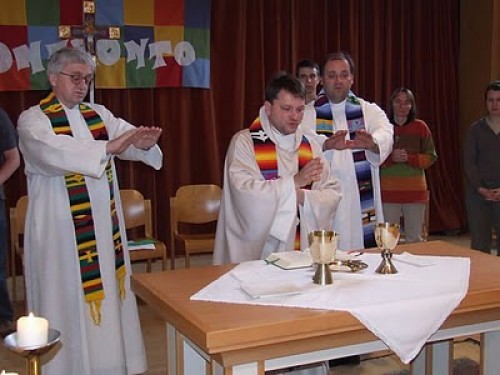The New Sacraments
The minister who confers a Sacrament must have the intention of doing that which the Church and Christ intends (and do not what the false Church of Vaticano II intends or what the masons intend). And to do so in a right manner, the minister must use a Catholic RITE which Indeed was given by Christ for that purpose and therefore is indeed capable of signifying CLEARLY the Grace that the visible sign produces.
Begining with, let us remember the comdenation of the council of Trent (Canon 11):
“If anyone says that in ministers, when they effect and confer the sacraments, there he does not requiere at least the intention of doing what the Church does, let him be Anathema.”
“If anyone says that in ministers, when they effect and confer the sacraments, there he does not requiere at least the intention of doing what the Church does, let him be Anathema.”
Moreover, in whatever “fórmula” or sacramental change of the true Sacraments, if it does not reflect the intention that Christ had when He created it, this very fact alone makes that modified Sacrament invalid.
The meaning of any sacramental form must be a determinated one, it must be unequivocal, that is, it must be exclusive and univocal. By its very essence it cannot be at all equivocal, unclear, or ambiguous.
By its very definition a Sacrament is a sensible sign producing the grace signified. If the words used for this signification are ambiguous, it would therefore be obvious that in such a case Grace would not be granted because it is NOT signified. Therefore the Sacrament would be invalid.
In the especific case of the
New Mass and of the New RITE of priesly ordenation the “grace” signified is ambiguous and therefore incapable of producing Grace. Those New rites moreover, preecisely because the ambiguity, they are incapable of being faithful at the necessity of having the intention of doing what the Church and Christ does. Based upon this solid principles, we can safely conclude that these “New” rites by themselves are invalid.
New Mass and of the New RITE of priesly ordenation the “grace” signified is ambiguous and therefore incapable of producing Grace. Those New rites moreover, preecisely because the ambiguity, they are incapable of being faithful at the necessity of having the intention of doing what the Church and Christ does. Based upon this solid principles, we can safely conclude that these “New” rites by themselves are invalid.
Therefore one cannot accept Sacraments from a “priest” that was ordained with the New RITE of ordenation, in the same way one cannot accept the New Mass from the hands of a valid priest.
